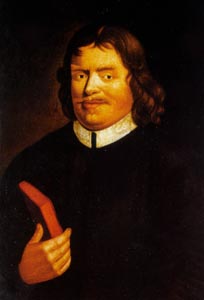 |
Bunyan, John 1628-88), English writer and Puritan minister, author of The Pilgrim's Progress, one of the most famous religious allegories in the English language.
Bunyan was born in November 1628 in Harrowden in the Wixamtree Hundred (Eastcotts parish) of Bedfordshire, the son of a tinker.. He was baptised in Elstow. The Bunyan family had been settled in that county since the beginning of the thirteenth century. Thomas Bunyan, his father, was a "brazier", or tinker, and John was brought up to his father's trade. But after his mother's death in 1644, he enlisted in the army; probably on the side of the Parliament, but as to this there is no direct evidence. In 1646 the army was disbanded; but before that Bunyan had passed through an experience which had left a lasting mark on him. "When I was a soldier," he says, "I with others were drawn out to go to such a place to besiege it; but when I was just ready to go one of the company desired to go in my room, to which when I had consented, he took my place; and coming to the siege, as he stood sentinel he was shot into the head with a musket bullet and died."
About 1648 he married Margaret Bentley, a member of one of the Puritan sects of the day; Bunyan experienced a religious conversion and joined her church. With her, Bunyan talked of religion, and read in two books which he names: "The Plain Man's Pathway to Heaven", by Arthur Dent (first published in 1601), and "The Practice of Piety (1612). During the four years he went through a terrible spiritual struggle. In speaking of himself afterwards, he describes himself as the worst of sinners; but the only wickedness in which he is known to have indulged is "swearing, lying, and blaspheming", and from coarser vices he seems to have been free. The fury of his spiritual struggle, and the darkness of his own description of himself, both were due to the strength and depth of his own nature.
In 1653 he joined Mr. Gifford's church in Bedford, which then worshipped in St. John's Church, and a year or two later he went to live in that town. He began about this time to preach, and so great was his success that he was set apart more especially for this work. In 1655 Bunyan became one of the leaders of a congregation of Nonconformists in Bedford, giving sermons as a lay preacher. After his wife died, Bunyan remarried and became a popular preacher, speaking to large audiences. However, after the restoration of Charles II in 1660, Puritans lost the privilege of freedom of worship, and it was declared illegal to conduct divine service except in accordance with the forms of the Church of England. Bunyan, who persisted in his unlicensed preaching, was confined to Bedford county jail from 1660 to 1672, although during a part of this time he was allowed a degree of freedom and was able to support his family by making shoelaces. Arrested in 1660 for unlicensed preaching, he spent 12 years in prison. There he wrote his spiritual autobiography, Grace Abounding to the Chief of Sinners (1666), and other books. Imprisoned a second time, he began his masterpiece, Pilgrim's Progress from This World to That Which Is to Come (1678, second part 1684). An allegory of Christian's journey from the City of Destruction to the Celestial City, it is written in a prose that unites biblical eloquence with the clarity of common speech.
While Bunyan was in prison his library consisted of the Bible and the Book of Martyrs by the theologian John Foxe. Studying the content and literary style of these works, Bunyan began to write religious tracts and pamphlets. Before his release he wrote the first of his major works, the spiritual autobiography Grace Abounding to the Chief of Sinners (1666).
In 1672, on his release, Bunyan was chosen minister of the community at Bedford with whom he worshipped, and a barn in Mill Lane was licensed for their meeting-place. In 1675 Bunyan was imprisoned for six months, in the winter of 1675-6, in the jail on Bedford bridge, and during that time he probably wrote the major part of his masterpiece, The Pilgrim's Progress from This World to That Which Is to Come, a prose allegory of the pilgrimage of a soul in search of salvation (1st part published 1678; 2nd part, 1684). Ten editions of this great work were printed during Bunyan's lifetime, and it eventually became the most widely read book in English after the Bible. It exerted great influence on later English writers. Noted for its simple, biblical style, The Pilgrim's Progress is now generally considered one of the finest allegories in English literature, and it has been translated into many languages.
During his last years Bunyan was universally recognized as the leading Puritan clergyman and author. In 1688 he travelled to London, and died there of pneumonia on August 31, 1688, and he was buried in Bunhill Fields, London. His other writings include The Life and Death of Mr. Badman (1680), a description of the life of a reprobate, and The Holy War (1682), a religious and political allegory.
Major Works
Roger Sharrock edited and introduced Grace Abounding and Pilgrim's Progress . Oxford, 1966. This volume also includes A Relation of the Imprisonment, unpublished until 1765.
The Holy City ( 1665 ).
Grace Abounding to the Chief of Sinners ( 1666 ). On Line
The Pilgrim's Progress (1678, 1684 ). On Line
The Life and Death of Mr Badman ( 1680 ).
The Holy War ( 1682 ). On Line
The Heavenly Footman ( 1692 ).
JB's Last Sermon On Line ( 1689 ).
On-Line Poem
"Complete" editions of Bunyan were edited by George Offor and Henry Stebbing in the early 1860's.
About Bunyan
John Brown, John Bunyan (1628-1688): His Life, Times, and Work, 1885, Revised by Frank Mott Harrison, 1928. Reprinted, Archon, 1969.
Gwilym Griffith, John Bunyan. Hodder and Stoughton, 1927.
Frank Mott Harrison, A Bibliography of the Works of John Bunyan. Oxford, 1932.
G. B. Harrison, John Bunyan: A Study in Personality. Archon, 1967. Originally published by Dent, 1928.
William Hamilton Nelson, Tinker and Thinker: John Bunyan, 1628-1688. Willett, Clark and Colby, 1928.
Roger Sharrock, John Bunyan. Macmillan, 1968.
David E. Smith, John Bunyan in America. Indiana, 1966. About Bunyan's influence on American literature.
William York Tindall, John Bunyan, Mechanick Preacher. Russell and Russell, 1964. Originally published by Columbia, 1934.
James Blanton Wharey, A Study of the Sources of Bunyan's Allegories. Gordian, 1968. Originally published , 1904.
Ola Elizabeth Winslow, John Bunyan. Macmillan, 1961.
Bibliography:
Bunyan, J. (1666) "Grace abounding to the chief of sinners" (1993) Whitaker House, Springdale
Bunyan, J. (1678), "Pilgrim's Progress in the similitude of a dream"
Bunyan, J. (1682), "Holy War made by Shaddai upon Diabolus"
Bunyan, J. (1685), "Pilgrim's Progress, part II"
Bunyan, J. (??), "... to be a pilgrim", song
